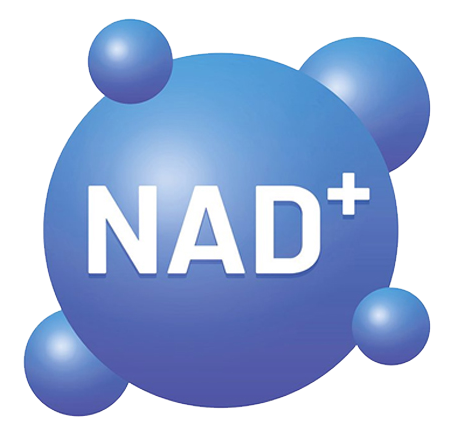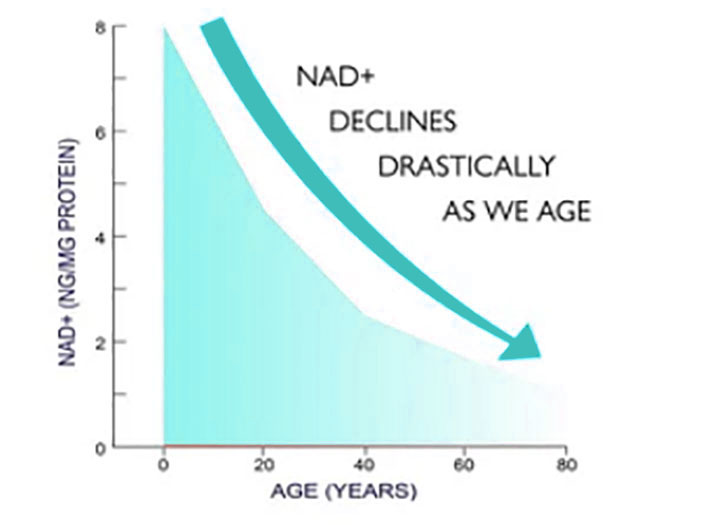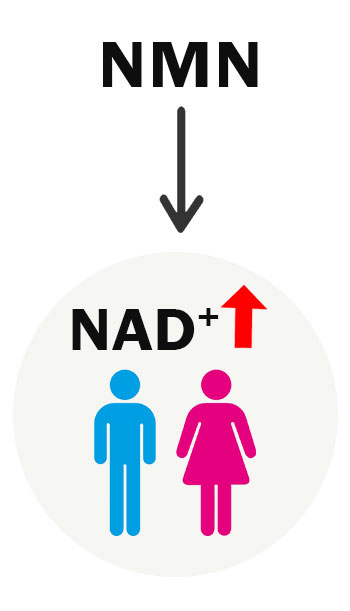The Science
What is NAD+?
NAD+ aids other enzymes to function correctly which then helps multiple processes in our bodies ranging from brain cell growth to repairing DNA to assisting mitochondria to generate energy from food. Essentially, NAD+ plays a critical role in maintaining cellular and metabolic functions, which translates to better health and longevity of our cells, organs, and bodies as a whole.

Finding ways to boost your NAD levels has become the key to a longer life.
What happens to NAD+ levels as we age?
As we age, our natural levels of NAD+ decline, and it is believed that this is the reason for many age-related diseases.
The other problem with NAD+ is that it is too large a molecule to cross the cell membrane barrier.
Studies have shown that supplementing with NMN, or nicotinamide mononucleotide, can raise your NAD+ levels.
NAD+ is essential for our cells to function. It transports energy & power mitochondria.

It is essential to maintain optimum cellular NAD+ to ensure we age healthy.
Human clinical trials have demonstrated the benefits of supplementing with NMN.
STUDY # 1
CLINICAL RESEARCH FINDINGS
The efficacy and safety of β-nicotinamide mononucleotide (NMN) supplementation in healthy middle-aged adults: a randomized, multicenter, double-blind, placebo-controlled, parallel-group, dose-dependent clinical trial.
CONCLUSIONS
ABSTRACT
A clinical trial of 80 healthy middle-aged adults given oral doses of NMN at 300 mg, 600 mg, or 900 mg over 60 days to evaluate blood NAD concentration with dose dependent regimens.
DATE: Feb 2023
STUDY # 2
CLINICAL RESEARCH FINDINGS
Nicotinamide Adenine Dinucleotide Augmentation in Overweight or Obese Middle-Aged and Older Adults: A Physiologic Study.
CONCLUSIONS
ABSTRACT
A clinical trial of 30 overweight or obese adults > 45 years given oral doses of NMN at 1000 mg or a placebo daily for 28 days to evaluate body weight, liver, muscle, intra-abdominal at, insulin sensitivity, blood pressure, lipids, physical performance, and muscle bioenergetics.
DATE: July 2023
STUDY # 3
CLINICAL RESEARCH FINDINGS
Nicotinamide mononucleotide increases muscle insulin sensitivity in prediabetic women.
CONCLUSIONS
ABSTRACT
A 10 week clinical trial of postmenopausal women with prediabetes who were overweight or obese given oral doses of NMN at 250 mg or a placebo daily to evaluate the effect of NMN supplementation on metabolic function.
DATE: June 2021
STUDY # 4
CLINICAL RESEARCH FINDINGS
Nicotinamide mononucleotide supplementation enhances aerobic capacity in amateur runners: a randomized, double-blind study.
CONCLUSIONS
ABSTRACT
A 6 week clinical trial of 48 young and middle-aged recreationally trained runners aged 27-50 years were given oral doses of either a placebo, NMN at 300 mg, 600 mg, or 1200mg daily to evaluate the effect of NMN supplementation on aerobic capacity of runners.
DATE: July 2021
STUDY # 5
CLINICAL RESEARCH FINDINGS
The Impacts of Short-Term NMN Supplementation on Serum Metabolism, Fecal Microbiota, and Telomere Length in Pre-Aging Phase.
CONCLUSIONS
ABSTRACT
A 90 day clinical trial of 8 healthy men aged 45-60 years (pre-aging phase) given NMN at 300mg/day dosage to evaluate the supplementary effect on the telomere length of the peripheral blood mononuclear cell (PBMC).

